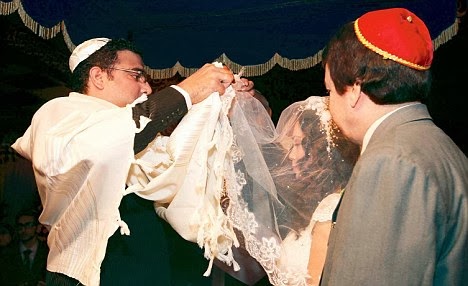By Miri –
Shay Agnon, one of the central figures of modern Hebrew fiction, was born as Shmuel Yosef Halevi Czazkes. He adopted his surname from his first published novel “Agunot”, meaning “the Chained” and referring to Jewish women, who were abandoned by their legal husbands and left without a writ of divorce. Those women are trapped in a defunct marriage, they cannot legally remarry and, in the case of a woman left alone with her children, will not receive any financial support, as she is not recognised as a single mother until her husband consents to the divorce. Agnon’s book was published in 1924, and yet not too much has changed regarding the laws regulating marriage and divorce in Israel, which are still under the auspices of state-recognised religious authorities.
Marriage and Divorce in the Jewish Communities
 Since Ottoman times, matters of personal status, such as marriage, are determined by the respective religious authorities, Jewish, Muslim, Christian, or otherwise. In the Jewish community all decisions are based on the Orthodox rulings ofthe chief rabbinate, which entails that only people who are recognised as Jews under Orthodox Judaism can get married in Israel. Because of those strictly halakhic rulings, many marriages, such as inter-faith, not to mention same-sex, cannot be legally performed in Israel, and an increasing number of Israeli citizens opt to enter a civil marriage abroad, and have it later registered by the state. According to the Central Bureau of Statistics, 20% of the Israeli citizens who married in 2010, did so outside of the country, many because they would not get the Rabbinate’s approval for their marriage, others in refusal of, and protest against having to marry according to Orthodox rituals.
Since Ottoman times, matters of personal status, such as marriage, are determined by the respective religious authorities, Jewish, Muslim, Christian, or otherwise. In the Jewish community all decisions are based on the Orthodox rulings ofthe chief rabbinate, which entails that only people who are recognised as Jews under Orthodox Judaism can get married in Israel. Because of those strictly halakhic rulings, many marriages, such as inter-faith, not to mention same-sex, cannot be legally performed in Israel, and an increasing number of Israeli citizens opt to enter a civil marriage abroad, and have it later registered by the state. According to the Central Bureau of Statistics, 20% of the Israeli citizens who married in 2010, did so outside of the country, many because they would not get the Rabbinate’s approval for their marriage, others in refusal of, and protest against having to marry according to Orthodox rituals.
When it comes to divorce the authority of the Rabbinate even extends to those who married abroad in civil ceremonies that were registered in Israel. In order to legally terminate a marriage a centuries old ritual has to be performed in which men deliver handwritten divorce decrees into the cupped hands of the women, who then must hold the paper aloft. A rabbi tears the document, called a get, into pieces, which are then filed for record-keeping.
 |
| Not in Israel: Jewish lesbian wedding |
According to women groups, 1 in 5 husbands, approximately 3,400 men a year, refuse to consent to, and therefore effectively block the divorce process initiated by the wife. In those cases the religious courts are authorised to issue various restrictive orders against the men who refuse to obey court rulings calling for a divorce, including imprisonment. Usually most of those cases are eventually settled, but others can drag on for years or decades, with the women remaining in a social limbo situation.
Many attempts have been made to implement civil unions in Israel, specifically upon the request of Israel’s LGBT community, but were usually blocked by the religious parties in the Knesset. Last year a bill was submitted by the centrist Yesh Atid party that once more proposes the establishment of civil unions, in order to enable people, regardless of religion or sexual orientation, to apply for a secular civil union, which would fall under the same legal status as marriage. The chances of the bill to pass the vote of the national-religious parties and be implemented as law are estimated to be very slim.
Palestinian Citizens of Israel and the Amendment to the Citizenship and Entry into Israel Law
 |
| Direct action against the Citizenship and Entry into Israel Law |
Non-Jewish citizens of Israel basically encounter more or less the same problems as the Jewish communities, depending on the restrictiveness of their respective religious authorities. Palestinian citizens of Israel, however, whether Christian or Muslim face a whole different problematic if they choose to marry a Palestinian from the West Bank, Gaza or a purported enemy state. Introduced in 2003 as emergency legislation during the Second Intifada, the Amendment to the Citizenship and Entry into Israel Law has prevented thousands of Palestinians from the West Bank and Gaza, who are married to Israeli citizens, from obtaining residency permits and/or citizenship in Israel, and thus from living with their spouses, unless they decide to leave the country. The law has been heavily criticised as constituting a clear case of state-sanctioned racial discrimination against Arabs, and as encouraging Palestinian citizens of Israel to leave the country. Acknowledging the discriminatory nature of the law, a High Court Justice publicly stated that “human rights are not a prescription for national suicide”, thereby affirming the rationale behind the ruling of maintaining “a Jewish majority … and character of the state”.

Comment (0)